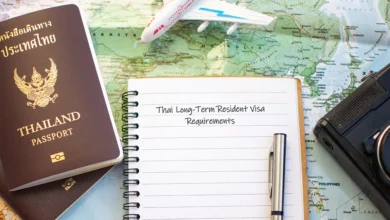Retirement should be a time of relaxation, adventure, and rediscovery—and for thousands of expats each year, Thailand offers the perfect destination to do just that. Whether you’re drawn by the allure of pristine beaches, the low cost of living, or the warm hospitality of the Thai people, retiring in the Land of Smiles has never been more appealing.
In this comprehensive guide, we’ll take you through everything you need to know to retire comfortably in Thailand, from budgeting and visas to choosing the right city and embracing the local lifestyle.
Why retire in thailand?
Thailand isn’t just a holiday hotspot—it’s a practical and enriching destination for retirees. Here’s why:
-
Affordability: Low cost of living without sacrificing comfort
-
Tropical Climate: Warm year-round, perfect for beach lovers and snowbirds
-
Top-notch Healthcare: Modern hospitals with English-speaking doctors
-
Expat Communities: Feel at home with vibrant social circles
-
Scenic Diversity: Beaches, mountains, rural life, and modern cities
Now let’s dive into the essential components of retiring in Thailand.
Step 1: Understanding the Thai Retirement Visa
To retire legally in Thailand, you’ll need a Non-Immigrant O-A or O-X Retirement Visa. The most common is the O-A visa, which allows retirees over 50 to stay in Thailand for a full year, with yearly renewals.
Requirements for the O-A Visa:
-
Be 50 years or older
-
No criminal record
-
Valid passport with at least 1 year of validity
-
Proof of financial support:
-
800,000 THB (about $22,000 USD) in a Thai bank, or
-
65,000 THB/month in income (around $1,800 USD), or
-
A combination of both
-
-
Medical insurance covering 40,000 THB for outpatient and 400,000 THB for inpatient care
You must also report your address to immigration every 90 days. Some retirees use a visa agent to handle paperwork, especially during the renewal process.
Step 2: Cost of Living in Thailand
One of the most attractive aspects of retiring in Thailand is the affordability. You can enjoy a high standard of living at a fraction of what you’d spend in the West.
Average Monthly Expenses:
-
Rent (1-bedroom condo): $300–$600
-
Utilities and internet: $80–$120
-
Food and groceries: $200–$400
-
Health insurance: $75–$150
-
Transportation: $50–$100
-
Entertainment & dining out: $100–$300
You can live comfortably on $1,200 to $2,000/month, though many couples live quite well on $2,500/month with all the perks—dining, travel, and entertainment included.
Step 3: Best Places to Retire in Thailand
Thailand offers a range of living environments to suit every lifestyle, from laid-back beach towns to bustling metropolises.
1. Chiang Mai
-
Cool mountain air, affordable living, and a relaxed vibe
-
Rich in culture and close-knit expat communities
-
Ideal for digital nomads and retirees alike
2. Bangkok
-
Thailand’s capital offers world-class hospitals, shopping, and entertainment
-
Ideal for retirees who love city life and convenience
-
Slightly higher living costs but offers everything in one place
3. Hua Hin
-
Royal beach town with a large Western expat community
-
Popular with retirees for its quiet atmosphere and golf courses
-
Good hospitals and infrastructure
4. Phuket
-
Island living with beach access and international-standard services
-
Great for water sports, leisure, and a luxury retirement lifestyle
-
Many upscale condos and villas to choose from
5. Pattaya
-
Lively beach town with a mix of entertainment and relaxation
-
Affordable and popular with long-term Western retirees
-
Lots of social events and clubs for foreigners
Step 4: Finding Your Dream Home
When it comes to housing, you have two main choices: renting or buying.
Renting:
-
Most retirees prefer to rent, especially in the first few years
-
Allows flexibility and easier location changes
-
Monthly rent for a one-bedroom condo: $300–$600 depending on location
Buying:
-
Foreigners cannot legally own land but can own condominiums outright
-
You’ll need to transfer money from abroad and register it correctly
-
Popular among retirees planning permanent settlement
Tip: Use trusted real estate agents or property platforms like DDproperty or Hipflat to explore options.
Step 5: Managing Finances and Banking
Living in Thailand is easier when you open a Thai bank account. Most major Thai banks (like Bangkok Bank or Kasikorn Bank) offer accounts to foreigners with valid visas.
Benefits:
-
Easier to pay bills and withdraw cash
-
Can receive pension or Social Security payments
-
Required for retirement visa financial proofs
Also, consider using international banking tools like Wise or Revolut to transfer money at better exchange rates.
Step 6: Healthcare and Insurance
Thailand boasts a top-tier private healthcare system. Hospitals like Bumrungrad International (Bangkok) and Bangkok Hospital (Chiang Mai, Phuket) offer world-class service.
Common Health Services:
-
General check-ups: $30–$100
-
Specialist consultations: $50–$100
-
Dental cleaning: $30–$50
-
Prescription medication: Generally affordable
Retirees should invest in expat health insurance, which can cost $800–$2,000/year depending on age and coverage.
Step 7: Embracing the Lifestyle
Retiring in Thailand isn’t just about saving money—it’s about living better. Here are just a few ways you’ll enjoy your time:
-
Eat Well: Fresh, delicious Thai food is available everywhere—from street stalls to fine dining. Many Western and international options are available, too.
-
Stay Active: Golf, swimming, hiking, yoga, and even Muay Thai are popular among older expats.
-
Learn New Things: Take cooking classes, learn the Thai language, or try traditional crafts.
-
Explore: Weekend trips to islands, national parks, or ancient temples are affordable and easy.
Step 8: Building a Community
One of the biggest fears of retiring abroad is loneliness, but in Thailand, expats form strong communities.
You’ll find:
-
Expat clubs and meetups
-
International churches and meditation centers
-
Fitness groups, hobby classes, and social activities
Joining Facebook groups like “Retire in Thailand” or local forums helps you connect and stay informed.
Step 9: Staying Connected With Family and Home
Thanks to modern tech, staying in touch with family is easier than ever.
-
Use Skype, WhatsApp, or Zoom for video calls
-
Stream shows and news using a VPN for services like Netflix or BBC
-
Travel back home is accessible with international airports in Bangkok and Phuket
Step 10: Navigating Cultural Differences
Understanding Thai culture will help you enjoy retirement more fully.
Key points:
-
Thai people value respect, politeness, and calmness
-
Dress modestly in temples or rural areas
-
Avoid heated debates or public criticism
-
Learn some basic Thai phrases—it goes a long way
Cultural immersion doesn’t mean abandoning your roots—it means enriching your experience.
Common Challenges (And How to Overcome Them)
While retiring in Thailand offers many advantages, it’s important to be aware of potential challenges:
1. Language Barrier
-
English is widely spoken in tourist areas, but less so in rural regions
-
Learn basic Thai or take a language class
2. Visa Bureaucracy
-
Paperwork can be complicated
-
Hire a visa agent or immigration lawyer for peace of mind
3. Healthcare for Chronic Illnesses
-
Research hospitals and insurance plans if you have ongoing conditions
4. Cultural Adjustment
-
Be open-minded, patient, and respectful
Final Thoughts
Retiring comfortably in Thailand is more than just a dream—it’s a practical, affordable, and deeply fulfilling reality. With the right preparation, you can enjoy a retirement filled with sunshine, adventure, and peace of mind.
Whether you’re relaxing on the beaches of Phuket, sipping coffee in a Chiang Mai café, or strolling through Bangkok’s vibrant streets, Thailand offers a retirement lifestyle that’s both exciting and secure.





